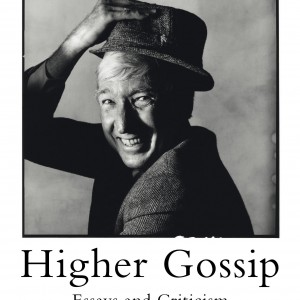John Updike, Higher Gossip. Essays and Criticism
 Am o mare admiraţie (aş zice chiar slăbiciune) pentru John Updike şi, deşi este unul dintre prozatorii nord-americani destul de bine traduşi la noi (romanele lui au apărut la Univers, apoi şi în Colecţia „Cotidianul”, şi la Paralela 45, după care a fost preluat de Humanitas Fiction, care are meritul de a-i fi tradus, în perioada 2008-2011, tetralogia Rabbit), personal sînt frustrat că proza lui scurtă (absolut admirabilă!) rămîne încă necunoscută la noi.
Am o mare admiraţie (aş zice chiar slăbiciune) pentru John Updike şi, deşi este unul dintre prozatorii nord-americani destul de bine traduşi la noi (romanele lui au apărut la Univers, apoi şi în Colecţia „Cotidianul”, şi la Paralela 45, după care a fost preluat de Humanitas Fiction, care are meritul de a-i fi tradus, în perioada 2008-2011, tetralogia Rabbit), personal sînt frustrat că proza lui scurtă (absolut admirabilă!) rămîne încă necunoscută la noi.
Higher Gossip este o colecţie postumă din scrierile de non-ficţiune ale lui Updike, texte apărute iniţial ca eseuri prin diferite volume, ale lui sau ale altora, ori ca articole de presă (prin reviste americane, britanice sau franţuzeşti de prestigiu ca The New Yorker, The New York Review of Books, The New York Times Book Review, Granta, The Observer, The Atlantic, National Geographic, TLS sau Le Nouvel Observateur). Această descriere face însă un deserviciu cărţii de faţă al cărei conţinut este încă şi mai divers, dar, mai ales, mult mai consistent decît ţi-ai putea imagina.
În prima dintre cele cinci mari secţiuni ale volumului (care are, în total, nu mai puţin de 500 de pagini), sînt adunate cîteva proze scurte (dintre care „The Writer in Winter”, „The Beloved” sau „The Lens Factory” sînt grozave), plus cinci poeme. În secţiunea „Book Chat” sînt cuprinse prefeţele, recenziile, eseurile şi crochiurile literare dedicate unor scriitori precum Fitzgerald („his style is hard to parody”), Hemingway („he is accused of being a lover of violence, but a fascination is not an endorsement”), Vonnegut („it seemed to me that he did not always get enough credit for his artistry”), Carver („not since Hemingway, perhaps, has anyone built so lovingly in stacks of plain sentences”), Nabokov, Cheever ş.a. sau lui Cole Porter (excelent eseu despre versurile acestuia, pentru care, apropo, Woody Allen a avut dintotdeauna o mare admiraţie), plus un extraordinar eseu despre umorul în literatură.
În secţiunea „Gallery Tours”, Updike apare ca un foarte interesant şi priceput eseist de arte vizuale, scriind despre artişti din toate epocile, de la „old masters” ca El Greco („the strangeness begins with his name, which was properly Domenikos Theotokopoulos”), prin Van Gogh, Seurat şi suprarealişti („the surrealists have not aged well: Dalí seems in retrospect to have gone from sick to slick, from sensational to sentimental, his intensity too much a matter of bejewelled surface detail; the celebrated collages of Max Ernst savor of yellow paper and dried glue – the whole principle of incongruous juxtaposition has been turned into a MTV cliché; Miró seems too much the cartoonist, his linear fancies centerless and spindly etc.”), pînă la fotografii contemporani. Eseurile, deopotrivă aplicate şi savuroase, se numesc „New kind on the block” sau „Can genitals be beautiful?” – acesta din urmă fiind despre arta lui Egon Schiele („the genitals facts are there, plainly enough, but as checkpoints on a map of anxiety”).
În grupajul „Pet Topics” sînt texte dintre ce mai variate, de la ştiinţă la sporturi (în special golf şi fotbal american: „I fell in love with golf when I was 25; it would have been a healthier relationship had it been an adolescent romance or, better yet, a childhood rush”), pentru ca în secţiunea finală, favorita mea, intitulată „Table Talk”, să fie adunate eseurile despre maeştii săi („my main debt was to Hemingway; it was he who showed us all how much tension and complexity unalloyed dialogue can convey, and how much poetry lurks in the simplest nouns and predicates; other eye-openers for me were Kafka and John O`Hara, Mary McCarthy and John Cheever, Donald Barthelme and Nabokov, Joyce and James Thurber and Chekhov”), despre stil şi arta scrisului („when has happiness ever been the subject of fiction?”) sau a lecturii publice („reading something aloud is a good way to test it, to see the words do flow as when heard in your head; my effort while reading is to pronounce the words slowly and distinctly, letting them speak for themselves”), arta recenziei („try to understand what the author wished to do, and do not blame him for not achieving what he did not attempt”), poezie („had poetry paid as well as fiction, I would have written more of it”), librari („booksellers, you are the salt of the book world”), universul scriitorului, trenduri literare sau propria operă, conferinţe şi speech-uri ţinute cu varii ocazii, cîteva pagini de interviuri („I have trouble, writing about America, in reminding myself that everybody now has cell phones, that sex without condoms is flirting with death by AIDS, that everybody under 40 has grown up with computers and computer games, that people get cash day and night by feeding a plastic card into a machine, and so on”), note disparate sau scrisori către editori.
Higher Gossip (grozav titlu pentru un volum compozit cu ocazionale, sclipitoare texte) este o carte cu de toate, dar, mai ales, este o carte care musteşte de inteligenţa şi umorul lui Updike, care, apropo, ar fi împlinit, în acest martie, 83 de ani.
















There are no comments
Add yours